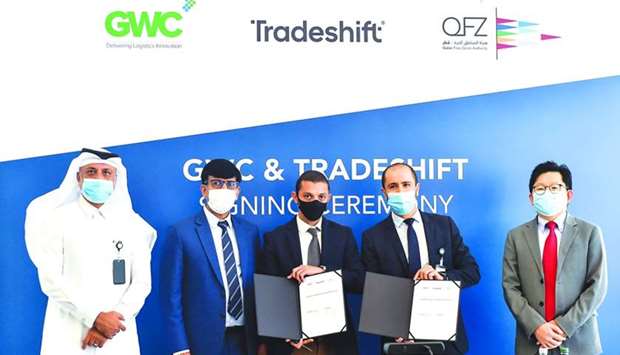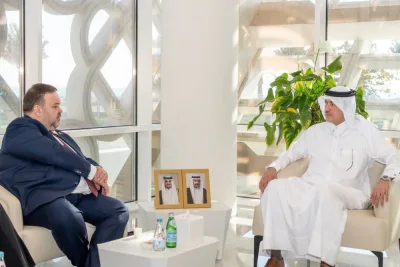Gulf Warehousing Company (GWC) and Tradeshift have recently signed a partnership agreement under the auspices of Qatar Free Zones Authority (QFZA) for the development of cloud-based solutions to drive efficiencies through digitisation of the supply chain.
The agreement was signed by GWC chief financial officer Hicham Nedjari and Tradeshift sales director Rachid Hamouchene in the presence of Fahad Zainal, QFZA’s chief corporate support officer and acting chief zones operating officer, as well as other officials.
GWC is a leading logistics provider in the Middle East region which was recently announced as the official logistics provider for the FIFA World Cup Qatar 2022, while Tradeshift is a global company specialising in the field of digital supply chain invoicing systems and marketplace development. Both firms are operating from Ras Bu Fontas Free Zone.
The partnership is also a demonstration of the growing role that QFZA plays in strengthening supply chains and bolstering Qatar’s position as a global hub for trade. The partnership is also a validation of QFZA’s vision to establish the free zones as a platform for companies to take advantage of the services from other businesses in the zones and create new market offerings.
Speaking to Gulf Times on the sidelines of the signing ceremony, Zainal described the partnership as “a critical journey” for QFZA.
He said Qatar would like to play an international role in free trade. The presence of leading companies like GWC and Tradeshift enables QFZA to sustain the whole supply chain of industries like technology and logistics, among others, he noted.
“Supply chain is very essential for Qatar, and we are trying to promote that as an international free trade zone in the country. Also, it validates our strategy by having a platform for such partnerships where international companies come and establish in Qatar and collaborate with local champions, so that by itself is a very important role.
“QFZA aims to attract various companies to the free zones that contribute to creating an attractive economic environment for investments while providing all means to ensure the smooth-running of businesses.” Zainal pointed out.
Underscoring the importance of the agreement with Tradeshift, Nedjari said: “Investment in advanced technology and digitisation is a cornerstone of our national economic growth strategy in line with the Qatar National Vision 2030. The digitisation of our procurement, invoicing, and payment system allows us to enhance efficiency in supply chain and logistics sectors, both essential for sustainable economic growth”. He also lauded QFZA’s role as a platform for collaboration.
Similarly, he said the partnership would help Tradeshift in building networks.
Doha Venture Capital (DVC), the investment platform of QFZA, focuses on attracting SMEs in strategic sectors, particularly companies developing advanced technologies, to take advantage of the growth opportunities in Qatar, the Mena region, and the world.
Hamouchene said the partnership with GWC will develop digital connections between companies in Qatar and other firms that are part of the ecosystem.
“GWC is very well-positioned to be the first company to undertake this initiative with Tradeshift, which is connecting companies hence, this is a perfect match,” he pointed out.
He added: “Being part of the free zone provides visibility to our company. We are strategically positioned now to reach out to other countries, as well. This is a major role that QFZA is playing. Moreover, all the administrative aspects are being handled by QFZA, which allows us to focus on our core business.
Zainal noted that digitisation has been increasing rapidly in the past few years and has been playing an important role in the logistics industry.
“Studies have shown that companies that have been leveraging on high-end digitisation have proven that their efficiency increased by about 4%, and even their profitability by 3%, so the more businesses are into digitisation the better efficiency and profitability for companies,” he explained.
Zainal said QFZA is concentrating on several sectors, such as emerging technologies and logistics, as well as cloud computing, so that Qatar would play a vital role in the Middle East “in providing these technologies.”
“We are targeting these sectors, as well as the supply chains of these sectors and whatever products or companies that can supply and sustain the economy of these industries. Hence, that would obviously create a new economy for Qatar and it will help align with the Qatar National Vision 2030, which is to diversify the economy,” Zainal stressed.
GWC is a leading logistics provider in the Middle East region which was recently announced as the official logistics provider for the FIFA World Cup Qatar 2022, while Tradeshift is a global company specialising in the field of digital supply chain invoicing systems and marketplace development. Both firms are operating from Ras Bu Fontas Free Zone.
The partnership is also a demonstration of the growing role that QFZA plays in strengthening supply chains and bolstering Qatar’s position as a global hub for trade. The partnership is also a validation of QFZA’s vision to establish the free zones as a platform for companies to take advantage of the services from other businesses in the zones and create new market offerings.
Speaking to Gulf Times on the sidelines of the signing ceremony, Zainal described the partnership as “a critical journey” for QFZA.
He said Qatar would like to play an international role in free trade. The presence of leading companies like GWC and Tradeshift enables QFZA to sustain the whole supply chain of industries like technology and logistics, among others, he noted.
“Supply chain is very essential for Qatar, and we are trying to promote that as an international free trade zone in the country. Also, it validates our strategy by having a platform for such partnerships where international companies come and establish in Qatar and collaborate with local champions, so that by itself is a very important role.
“QFZA aims to attract various companies to the free zones that contribute to creating an attractive economic environment for investments while providing all means to ensure the smooth-running of businesses.” Zainal pointed out.
Underscoring the importance of the agreement with Tradeshift, Nedjari said: “Investment in advanced technology and digitisation is a cornerstone of our national economic growth strategy in line with the Qatar National Vision 2030. The digitisation of our procurement, invoicing, and payment system allows us to enhance efficiency in supply chain and logistics sectors, both essential for sustainable economic growth”. He also lauded QFZA’s role as a platform for collaboration.
Similarly, he said the partnership would help Tradeshift in building networks.
Doha Venture Capital (DVC), the investment platform of QFZA, focuses on attracting SMEs in strategic sectors, particularly companies developing advanced technologies, to take advantage of the growth opportunities in Qatar, the Mena region, and the world.
Hamouchene said the partnership with GWC will develop digital connections between companies in Qatar and other firms that are part of the ecosystem.
“GWC is very well-positioned to be the first company to undertake this initiative with Tradeshift, which is connecting companies hence, this is a perfect match,” he pointed out.
He added: “Being part of the free zone provides visibility to our company. We are strategically positioned now to reach out to other countries, as well. This is a major role that QFZA is playing. Moreover, all the administrative aspects are being handled by QFZA, which allows us to focus on our core business.
Zainal noted that digitisation has been increasing rapidly in the past few years and has been playing an important role in the logistics industry.
“Studies have shown that companies that have been leveraging on high-end digitisation have proven that their efficiency increased by about 4%, and even their profitability by 3%, so the more businesses are into digitisation the better efficiency and profitability for companies,” he explained.
Zainal said QFZA is concentrating on several sectors, such as emerging technologies and logistics, as well as cloud computing, so that Qatar would play a vital role in the Middle East “in providing these technologies.”
“We are targeting these sectors, as well as the supply chains of these sectors and whatever products or companies that can supply and sustain the economy of these industries. Hence, that would obviously create a new economy for Qatar and it will help align with the Qatar National Vision 2030, which is to diversify the economy,” Zainal stressed.




